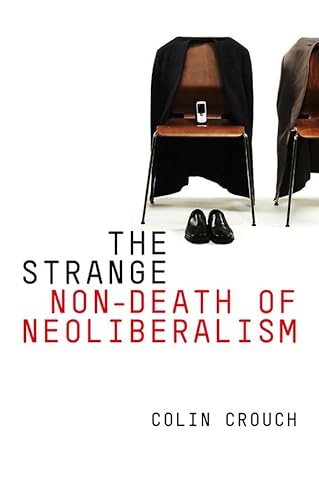
Inhaltsangabe
The financial crisis seemed to present a fundamental challenge to neo-liberalism, the body of ideas that have constituted the political orthodoxy of most advanced economies in recent decades. Colin Crouch argues in this book that it will shrug off this challenge.
Die Inhaltsangabe kann sich auf eine andere Ausgabe dieses Titels beziehen.
Über die Autorin bzw. den Autor
COLIN CROUCH is Professor of Governance and Public Management at Warwick Business School, Fellow of the British Academy, and expert consultant to the Directorate for Public Governance and Territorial Development, OECD. His previous publications include Post-Democracy.
Von der hinteren Coverseite
The financial crisis seemed to present a fundamental challenge to neo liberalism, the body of ideas that have constituted the political orthodoxy of most advanced economies in recent decades. Colin Crouch argues in this book that it will shrug off this challenge. The reason is that while neo liberalism seems to be about free markets, in practice it is concerned with the dominance over public life of the giant corporation. This has been intensified, not checked, by the recent financial crisis and acceptance that certain financial corporations are &;too big to fail'. Although much political debate remains preoccupied with conflicts between the market and the state, the impact of the corporation on both these is today far more important.
Several factors have brought us to this situation:
- The lobbying power of firms whose donations are of growing importance to cash-hungry politicians and parties
- The weakening of competitive forces by firms large enough to shape and dominate their markets
- The moral initiative that is grasped by enterprises that devise their own agendas of corporate social responsibility
Both democratic politics and the free market are weakened by these processes, but they are largely inevitable and not always malign. Hope for the future, therefore, cannot lie in suppressing them in order to attain either an economy of pure markets or a socialist society. Rather it lies in dragging the giant corporation fully into political controversy.
„Über diesen Titel“ kann sich auf eine andere Ausgabe dieses Titels beziehen.
Weitere beliebte Ausgaben desselben Titels
Suchergebnisse für The Strange Non-Death of Neo-Liberalism
The Strange Non-death of Neo-liberalism
Anbieter: AwesomeBooks, Wallingford, Vereinigtes Königreich
hardcover. Zustand: Very Good. The Strange Non-death of Neo-liberalism This book is in very good condition and will be shipped within 24 hours of ordering. The cover may have some limited signs of wear but the pages are clean, intact and the spine remains undamaged. This book has clearly been well maintained and looked after thus far. Money back guarantee if you are not satisfied. See all our books here, order more than 1 book and get discounted shipping. . Artikel-Nr. 7719-9780745651200
Gebraucht kaufen
Anzahl: 1 verfügbar
The Strange Non-death of Neo-liberalism
Anbieter: Bahamut Media, Reading, Vereinigtes Königreich
hardcover. Zustand: Very Good. Shipped within 24 hours from our UK warehouse. Clean, undamaged book with no damage to pages and minimal wear to the cover. Spine still tight, in very good condition. Remember if you are not happy, you are covered by our 100% money back guarantee. Artikel-Nr. 6545-9780745651200
Gebraucht kaufen
Anzahl: 1 verfügbar
The Strange Non-Death of Neo-Liberalism
Anbieter: PBShop.store UK, Fairford, GLOS, Vereinigtes Königreich
HRD. Zustand: New. New Book. Shipped from UK. Established seller since 2000. Artikel-Nr. FW-9780745651200
Neu kaufen
Anzahl: 1 verfügbar
The Strange Non-Death of Neo-Liberalism
Anbieter: Kennys Bookstore, Olney, MD, USA
Zustand: New. 2011. 1st Edition. Hardcover. The financial crisis seemed to present a fundamental challenge to neo-liberalism, the body of ideas that have constituted the political orthodoxy of most advanced economies in recent decades. The author argues that it will shrug off this challenge. Num Pages: 212 pages, black & white illustrations. BIC Classification: JPFK. Category: (P) Professional & Vocational. Dimension: 225 x 146 x 18. Weight in Grams: 396. . . . . . Books ship from the US and Ireland. Artikel-Nr. V9780745651200
The Strange Non-death of Neo-liberalism
Anbieter: moluna, Greven, Deutschland
Gebunden. Zustand: New. A highly approachable and illuminating argument in political economy . The story is packed with thought-provoking reframings: financial irresponsibility is now a collective good and the idea of a job now seems very weird to me indeed. The Guardian. Artikel-Nr. 556564036
Neu kaufen
Anzahl: 1 verfügbar
The Strange Non-Death of Neo-Liberalism
Anbieter: AHA-BUCH GmbH, Einbeck, Deutschland
Buch. Zustand: Neu. Neuware - The financial crisis seemed to present a fundamental challenge to neo liberalism, the body of ideas that have constituted the political orthodoxy of most advanced economies in recent decades. Colin Crouch argues in this book that it will shrug off this challenge. The reason is that while neo liberalism seems to be about free markets, in practice it is concerned with the dominance over public life of the giant corporation. This has been intensified, not checked, by the recent financial crisis and acceptance that certain financial corporations are 'too big to fail'. Although much political debate remains preoccupied with conflicts between the market and the state, the impact of the corporation on both these is today far more important.Several factors have brought us to this situation:\* The lobbying power of firms whose donations are of growing importance to cash-hungry politicians and parties;\* The weakening of competitive forces by firms large enough to shape and dominate their markets;\* The moral initiative that is grasped by enterprises that devise their own agendas of corporate social responsibility.Both democratic politics and the free market are weakened by these processes, but they are largely inevitable and not always malign. Hope for the future, therefore, cannot lie in suppressing them in order to attain either an economy of pure markets or a socialist society. Rather it lies in dragging the giant corporation fully into political controversy. Artikel-Nr. 9780745651200
Neu kaufen
Anzahl: 1 verfügbar

